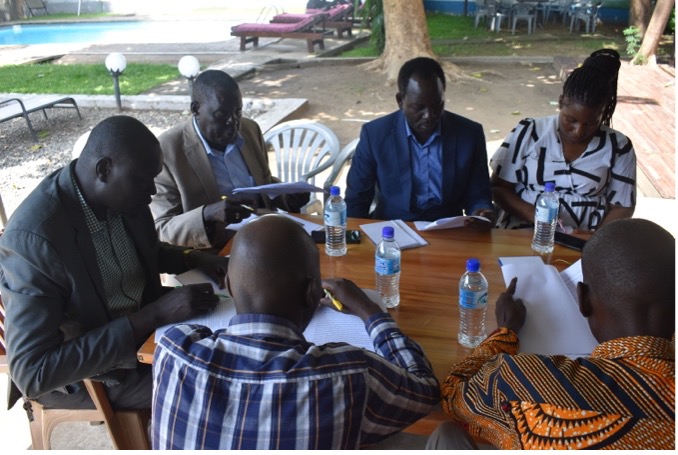Over the past few months, VSF Suisse, in collaboration with VSF Germany, has been coordinating the case study on CAHWs’ success and failure factors in South Sudan, as part of the USAID/BHA-funded project on CAHWs that VSF International is jointly implementing with WOAH.
 Building on the momentum of the workshop held in Niger in July, on the 9th of August, we organized a second workshop in Juba to close the country case study, after several weeks of field data collection that, despite challenges inherent to the national context, captured well the reality that CAHWs are facing in South Sudan.
Building on the momentum of the workshop held in Niger in July, on the 9th of August, we organized a second workshop in Juba to close the country case study, after several weeks of field data collection that, despite challenges inherent to the national context, captured well the reality that CAHWs are facing in South Sudan.
For decades, CAHWs have been at the heart of many humanitarian and development initiatives in South Sudan. Their contribution to last mile animal health service delivery is acknowledged by the government, which likes to remind the critical role CAHWs played in rinderpest eradication in the region in the early 2000s.
 However, CAHWs still face many challenges hampering their activity. The consultant who led the case study presented his findings to the participants and raised some key issues about the current policy context, access to veterinary pharmaceuticals, renewal and maintenance of equipment and training, among others. This workshop was the opportunity to bring these challenges to the table and seek solutions collectively.
However, CAHWs still face many challenges hampering their activity. The consultant who led the case study presented his findings to the participants and raised some key issues about the current policy context, access to veterinary pharmaceuticals, renewal and maintenance of equipment and training, among others. This workshop was the opportunity to bring these challenges to the table and seek solutions collectively.
About 25 participants (coming from the government, the academia and NGOs) attended the workshop. Participants worked in small groups to discuss study findings and draw up some concrete recommendations for more sustainable CAHW programs in the country.
 Workshop discussions highlighted the need to review current bills and policies to ensure CAHWs are adequately anchored in the policy context for their training, regulation, supervision and access to veterinary inputs. Another major issue raised during the workshop related to the provision to livestock keepers of subsidized/free drugs and services by organizations, preventing the mindset change that is needed to build sustainable animal health services.
Workshop discussions highlighted the need to review current bills and policies to ensure CAHWs are adequately anchored in the policy context for their training, regulation, supervision and access to veterinary inputs. Another major issue raised during the workshop related to the provision to livestock keepers of subsidized/free drugs and services by organizations, preventing the mindset change that is needed to build sustainable animal health services.
As aid is progressively reducing in South Sudan, workshop participants concluded acknowledging that the time has come to think in the long term and build resilient, business-oriented systems. The VSFs are ready to follow up on the workshop’s outcomes with decision makers in South Sudan over the coming months.

This article was made possible through support provided by the Bureau for Humanitarian Assistance, U.S. Agency for International Development, under the terms of Award No. 720BHA21IO00330 “Strengthening the enabling environment for Community Animal Health Workers (CAHWs) through development of competency and curricula guidelines”. This award is implemented by the World Organisation for Animal Health (WOAH, founded as OIE) in collaboration with Vétérinaires Sans Frontières International (VSF-Int). The opinions expressed in this article are those of the author(s) and do not necessarily reflect the views of the U.S. Agency for International Development.





